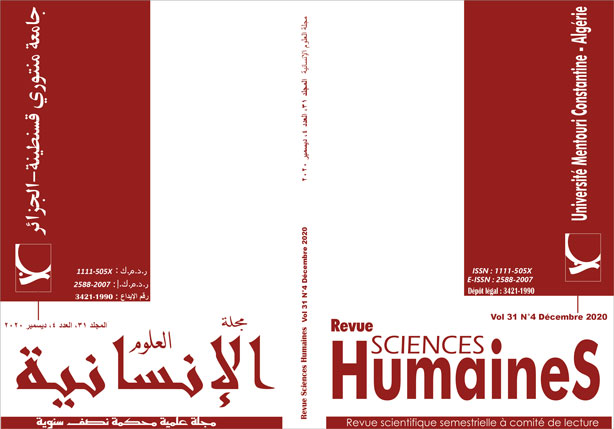Enhancing Students’ Motivation and Autonomy to Learn Online and Overcome Covid 19 Outbreak
الكلمات المفتاحية:
استقلالية الطلاب،، تحفيز الطلاب، التعلم الإلكتروني، تفشي مرض كوفيد 19الملخص
تهدف الدراسة الحالية إلى تحفيز طلاب الجامعات الجزائرية وتعزيز استقلاليتهم لاستخدام التعلم الإلكتروني بشكل فعال خصوصا لاجتياز الوضع الوبائي . في هذا الصدد، تم تحديد ثلاث فرضيات: أولاً، من المفترض أنه إذا كان لدى الطلاب دافع داخلي واستعداد للدراسة، فسوف ينجحون بالتأكيد. ثانيًا، إذا استخدم الطلاب مواقع الدراسة بشكل فعال ، قد يؤدي ذلك إلى تنشيط وتعزيز استقلاليتهم. ثالثا، تم الافتراض أيضًا أنه إذا طور طلبة اللغة الإنجليزية درجة معينة من الاستقلالية ، فسيؤدي ذلك إلى تحسين جودة التعلم الإلكتروني. للتحقق من هذه الفرضيات، تم إرسال استبيان إلى خمسون مدرسين للغة الإنجليزية في جامعة قسنطينة 1 لجمع وجهات نظرهم فيما يتعلق بالمتعلمين المستقلين والتعلم الإلكتروني الفعال خلال فترة جائحة كوفيد 19. تظهر النتائج أن الطلاب الذين لديهم دوافع داخلية تحفزهم علي التعلم بكل استقلالية. كما تظهر النتائج أن المعلمين الذين حفزوا طلابهم وظلوا على اتصال بهم عبر الإنترنت زادوا من استقلاليتهم حيث اصبح هؤلاء الطلبة ا يتقنون التعلم عن بعد.
التنزيلات
المراجع
Aronson, J. (2002). Improving Academic Achievement: impact of psychological factors on education. PhotoDisc, Inc. (p.64)
Benson, P. (2009). Making Sense of Autonomy in Language Learning. In R. Pemberton, S. Toogood & A. Barfield (Eds.), Maintaining control: Autonomy and language learning (pp. 13-26). Hong Kong: Hong Kong University Press. (P.14)
Benson, P. (2011). Teaching and Researching Autonomy in Language Learning (2nd ed.). Harlow: Longman. (Dickinson 1987 as cited in p. 14).
Boud, D. (1988). Moving Towards Autonomy. In D. Boud (Ed.), Developing Student
Autonomy in Learning (2nd ed.)(pp.17-39). London Candy (1987) cited in p. 21).
Brophy, J. (2004). Motivating students to learn (2nd ed). Mahwah, New Jersy: Lawrence Erlbaum Associates. ( p. 206)
Brophy, J. (2006). History of research on classroom management. In C. M. Evertson & C. S. Weinstein (Eds.), Handbook of classroom management: Research, practice, and contemporary issues (pp. 17-43). Mahwah, NJ: Lawrence Erlbaum Associates.
Dam, L. (1995). Learner Autonomy: From Theory to Classroom ¨Practice. Dublin: Authentik.
Dickinson, L. (1992). Learner Training for Language Learning. Dublin: Authentik. (p. 167)
Dörnyei, Z. (2001). Motivational Strategies in the Language Classroom. Cambridge: Cambridge University Press. (p. 120).
Farivar, A. ( 2015 ).The Impact of CALL on Iranian EFL Learners' Autonomy
Gough I, McGregor J. A, (2007). Wellbeing in Developing Countres: From Theory to Research Cambridge University Press P. 106
Higgs, J. (1988). Planning learning experiences to promote autonomous learning. In
D. Boud (Ed.) Developing student autonomy in learning (2nd ed.) (pp. 40-58).
New York: Nichols Publishing Company. (p.41)
Holec, H. (1981). Autonomy and Foreign Language Learning. Oxford: Pergamum. (First published in 1979), Strasbourg: Council of Europe. (p.3)
Jones, (2001) .Days and Nights on the Internet: The Impact of a Diffusing Technology
Jordan, A.et al (2008). Approaches to Learning: a guide for teachers. The Mc Graw-Hill. Open University Press. (Gagné and Medsker 1996. ; cited in Jordan et al., 2008, p.154).
Lamb, Tand Reinders , H (2008). (Learner and Teacher Autonomy: Concepts, Realities, and Responses. John Benjamin Publishing Company Sinclair (2008 cited in P.242).
Little, D. (1991). Learner Autonomy 1: Definitions, Issues and Problems. Dublin:
Authentik. (p. 4).
Little, D. (1995). Learner as Dialogue: The Dependence of Learner Autonomy on teacher Autonomy. System, 23 (2), 175-181. (p. 178)
Little, D. (2007). “Language Learner Autonomy: Some Fundamental Considerations Revisited”. Innovation in Language Learning and Teaching. 1.1, pp.14–29. ( p.16).
Mc Donough (1981). Psychology in Foreign Language Teaching. Harper Collins Publishers. (p.148)
Mckay,S; L and Hornberger,N.S. (1996). Sociolinguistics and LanguageTeaching.Combridge University Press (Gardner, (1985; cited in p.05)
Mitra, S. (2013). Build a School in the Cloud. In Ted Talk. Retrieved from www.ted.com/talks.
Oxford, R. (1990). Teaching and Researching Language Learning Strategies (2nd ed.). London: Routledge.
Oxford, R. (1999). Anxiety and the Language Learner: New Insights. In J. Arnold (Ed.), Affect in Language Learning (pp. 58-67). Cambridge, UK: Cambridge University Press. Rivers 1983 cited in p. 60)
Reeve, J., & Su, Y. (2014). Teacher Motivation. In M. Gagné (Ed.), The Oxford Handbook of Work Engagement, Motivation, and Self-determination Theory (pp. 349-362). Oxford: Oxford University Press. (pp. 354-356).
Reinders, H., & White, C. (2016). 20 Years of Autonomy and Technology: How far have we come and where to next? Language Learning & Technology, 20 (2), 143-154) (p. 144).
Ryan, R & Deci, E. (2000). Intrinsic and Extrinsic Motivations: Classic Definitions and New Directions Contemporary Educational Psychology 25, 54–67 (p. 54) , (p. 56)
Scharle, A & Szabo, A. (2000). Learner Autonomy: A Guide to Developing Learner Responsibility. Cambridge: Cambridge University Press. (p.4)
Sinclair, B. (1999). Survey Review: Recent Publications on Autonomy in Language Learning. ELT Journal, 53(4), 309-329.
Sinclair, B. (2008). Multiple voices: Negotiating pathways towards teacher and learner autonomy. In T. Lamb & H. Reinders (Eds.), Learner and teacher autonomy: Concepts, realities, and responses (pp. 237-266). USA: John Benjamins Publishing Company. Dam (1990 & 1995) cited in p.242-p. 243)
Slavin, R.E. (2003). Educational Psychology: theory and practice (7th Ed). Pearson Education, INC. ( p. 329) , (p. 292)
Slavin, R. E. (2006). Educational psychology: Theory and practice (8th ed.). Boston:Pearson Education . (p. 336)
Warschauer, M., & Healey, D. (1998). Computers and Language Learning: An Overview. Language Teaching, 31, 51-71. (p.65). http://dx.doi.org/10.1017/S0261444800012970
Williams, M and Burden, R. (1997). Psychology for language Teachers: a Social Constructivist Approach. Cambridge University press. , (p. 112)
التنزيلات
منشور
إصدار
القسم
الرخصة

هذا العمل مرخص بموجب Creative Commons Attribution-NonCommercial-ShareAlike 4.0 International License.












